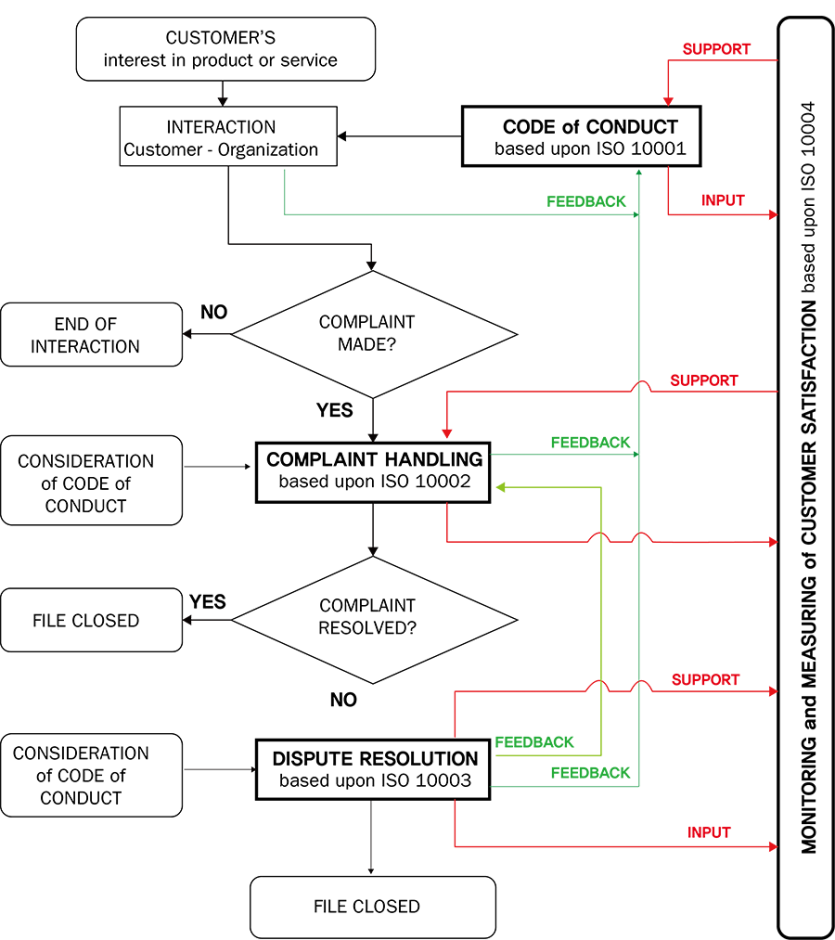Interrelationship between ISO 10001, ISO 10002, 10003, and 10004
페이지 정보

본문
Interrelationship between ISO 10001, ISO 10002, 10003, and 10004
ISO 10001, 10002, 10003, and 10004 are international standards for implementing customer satisfaction, handling complaints, resolving disputes, and monitoring and measuring customer satisfaction, respectively. These four standards can be used independently or in conjunction with each other, enabling the organization to enhance customer satisfaction.
ISO 10001 provides a guide to the organization's code of conduct to provide a way to maintain a high level of customer satisfaction.
ISO 10002 covers an internal guide to handling complaints related to products and services, allowing organizations to reduce the likelihood of problems and provide services that meet customer expectations.
ISO 10003 addresses solutions to disputes that cannot be resolved internally, which improves customer-organization interests and facilitates resolution of disputes.
Finally, ISO 10004 helps establish an effective process for monitoring and measuring customer satisfaction, which provides guidance for organizations to provide tailored services to external customers and constantly improve them.
Together, these four standards help organizations build a unified framework for monitoring and improving customer satisfaction.
A. ISO 10001:2018 Quality management — Customer satisfaction — Guidelines for codes of conduct for organizations
ISO 10001 provides guidance for planning, designing, developing, implementing, maintaining, and improving customer satisfaction practices, which include information processing, advertising, and commitments to special product and service attributes and performance.
ISO 10001 provides guidance to help organizations evaluate whether their customer satisfaction regulations meet customer needs and expectations and determine if they are clear and not misleading.
B. ISO 10001 Requirements
1. Scope
2. Normative references
3. Terms and definitions
4. Concepts and guiding principles
5. Framework for monitoring and measuring customer satisfaction.
6. Planning design and development
7. Operation
8. Maintenance and improvement
C. ISO 10001 Expected Effect
1. Prevent complaints by utilizing appropriate customer satisfaction practice norms.
2. We handle complaints when complaints are received internally.
3. If you cannot handle it satisfactorily internally, proceed with external dispute resolution.
4. Increase customer trust in fair trading practices and organizations.
5. Improve product and service-related expectations to reduce the likelihood of misunderstandings and complaints.
6. The need for new regulations to control an organization's response is potentially reduced.
D. ISO 10003:2018 Quality management — Customer satisfaction — Guidelines for dispute resolution external to organizations
This standard provides guidance to organizations to plan, design, develop, operate, maintain, and improve effective dispute resolution processes for complaints that have not been resolved by organizations.
It also helps organizations that want to seamlessly build processes that address product and service-related complaints and mediate disputes, which can increase customer satisfaction and increase the organization's reputation.
E. ISO 10003 Requirements
1. Scope
2. Normative references
3. Terms and definitions
4. Guiding principles
5. Dispute-resolution framework.
6. Planning, design, and development
7. Operation
8. Maintenance and improvement
F. Expected Effects of ISO 10003
1. Compared to court rulings, it costs less, the process is simple, and quick resolution is possible.
2. Improve customer satisfaction and loyalty.
3. Establish standards for the organization and coordinator/provider to evaluate claims fairly and efficiently.
4. Provides information on the accessibility, cost, and legal consequences of dispute resolution.
5. Improve your ability to identify and mitigate the causes of disputes.
6. Improve how complaints and disputes are handled within the organization.
7. Provides additional information for process and product improvement.
8. It helps protect your organization's reputation and prevent damage.
9. It strengthens domestic and international competitiveness.
10. Provide confidence in the fairness and consistency of dispute handling in the international market.

- 이전글AI Management System 24.05.24
- 다음글ISO 10015 24.04.11
댓글목록
등록된 댓글이 없습니다.


